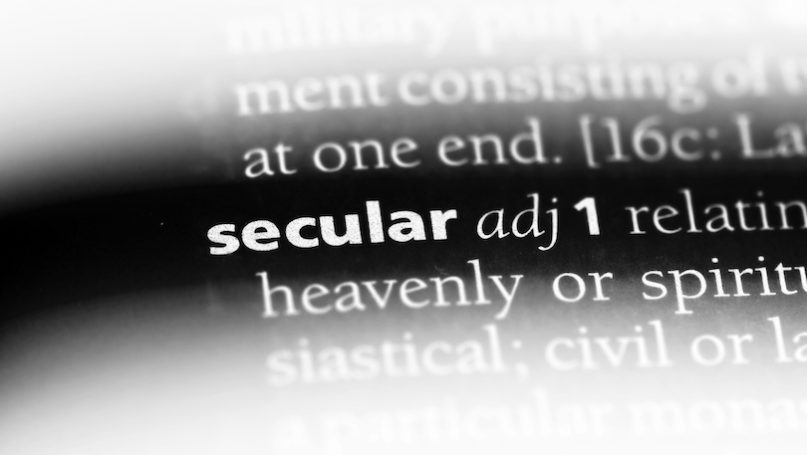
Secularism is a complex concept stemming from the historical process of secularization in the Western world. It originates in the Renaissance and gained momentum through events like the Protestant Reformation. This transformative process involved reducing religion’s influence on governmental institutions and emphasizing worldly foundations for power. Defining secularism is challenging, but it’s rooted in the idea of detaching religion from everyday social and political affairs. It encompasses various perspectives: philosophically, it rejects mystical aspects in favor of the existential; sociologically, it removes religious influences from social life; politically, it separates religion from politics, confining it to the private sphere. Leading scholars categorize secularism into types, involving shifts in beliefs, state-religion separation, and differentiation from religious norms.
While secularism is intended to ensure religious freedom and prevent the dominance of any particular religion in government affairs, it can sometimes inadvertently lead to epistemic injustices towards religion. Epistemic injustice refers to unfairness or discrimination in the way knowledge and information are distributed and valued within a society. Here are some ways in which secularism can potentially lead to epistemic injustices towards religion:
To begin with, secularism marginalizes religious knowledge and discards knowledge derived from scriptures, which had been a major source of knowledge for thousand years before the enlightenment. In a secular society, knowledge from religious sources might be devalued or dismissed as subjective or irrelevant, particularly in fields such as science and education. This can lead to the exclusion of valuable insights, perspectives, and cultural knowledge that religious traditions offer. For example, Canada’s dominant Judeo-Christian culture shifted towards secularism starting in the 1960s, accelerated by the Charter in 1982, emphasizing individualism over religious influence in societal values. Consequently, religious adherence is less valued and often met with suspicion in modern Canadian society. By the same token, a secular activist in Bangladesh mocked Muslims praying for rain, potentially conveying a message to fellow secular individuals that religious beliefs and practices hold no practical or relevant value. Many sociologists including Karl Marx calls religion ‘opium of the people’, thereby devaluing religious knowledge.
Devaluing religious knowledge fosters the marginalization of religious voices from the public sphere. The elevation of secular perspectives in secularism-centric discussions tends to relegate religious viewpoints to the sidelines or even exclude them altogether, ultimately culminating in a dearth of diversity within deliberations and the formulation of decisions.Prominent scholars analyzing secularism have typically classified it into three main categories. Keddie defines secularism as involving an increase in people with secular beliefs, reduced religious influence in major life domains, and heightened separation of the state from religion. Casanova’s categorization aligns with this, emphasizing distinctions between secularization as differentiation of secular and religious realms, decline in religious engagement, and relegation of religion to a private realm.
As religion becomes more separated from public discussions, this division extends to educational settings, resulting in an inadequate representation of religious ideas within curricula. Consequently, students might face limitations in their capacity to engage with a wide range of worldviews. This detachment from religious thought also carries the risk of neglecting the profound ethical and moral guidance that many religious traditions have provided over centuries. Dismissing these perspectives due to their religious heritage could lead to a significant loss of valuable insights into fundamental questions surrounding morality and values.
Hence, even same-sex marriage becomes an accepted value in a secular society. It’s important to be noted here that secular values primarily focus on shielding individuals from external influences, whereas religious values provide a safeguard against both external influences and personal inclinations. Religious principles not only offer protection from external factors but also guide individuals in managing their own tendencies. For instance, secular values might not find issue with consuming pornography, but religious values discourage such behaviour in the interest of spiritual growth.
Secular attitudes, though aimed at promoting impartiality, can inadvertently foster the misinterpretation and misjudgment of religious convictions and rituals. Such misunderstandings can foster prejudiced perceptions and reinforce biases against religious communities. The Western propagation of Islamophobia has, for instance, exacerbated negative preconceptions about Islam. Additionally, despite its intent for fairness, secularism can occasionally result in laws and regulations that inadvertently marginalize religious individuals or collectives. This is evidenced by cases where limitations on religious dress codes or observances disproportionately impact specific communities. Examples such as France and India’s prohibition of the hijab underscore this complex dynamic.
Paradoxically, efforts to separate religion from public life might infringe upon individuals’ freedom of religious expression, as they might feel compelled to suppress their beliefs to conform to secular norms. As Asad highlights, secularism encompasses more than just the detachment of politics from religion; it also actively intervenes in and molds religious practices and beliefs.
It’s crucial to acknowledge that whether these potential epistemic injustices are intrinsic to secularism or not, they undeniably emerge from the interpretations and applications of secularism worldwide. To genuinely establish an all-encompassing and fair society, efforts must be directed towards sidestepping these issues by appreciating and honoring various knowledge forms, encouraging open discourse, and guaranteeing the protection of the rights of religious individuals. Such measures can effectively forestall epistemic injustices and foster a more harmonious and considerate exchange between secular and religious viewpoints.
Further Reading on E-International Relations
- Secularism: A Religion of the 21st Century
- From (Communally-Based) Religion to Secularism in Indian Politics
- Transitional Justice in Tunisia: Any Role for Islam?
- United Moderate Religion vs. Secular and Religious Extremes?
- Religion in International Relations and the Russia-Ukraine Conflict
- Megachurches and the Living Dead: Intersections of Religion & Politics in Korea